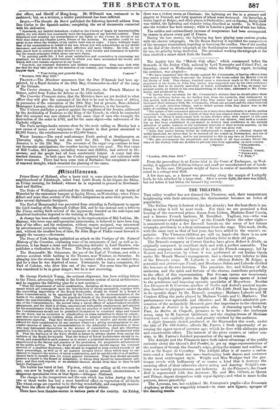THE THEATRES.
THE sultry weather has not thinned the Theatres; and, their temperaturi heightening with their attractions, the thermometer becomes an index of popularity. The Italian Opera is hottest of the hot already; but the heat there is no- thing to what it 'will be next week. For then we are promised a first hearing of the renowned prima donna from Lisbon, Madame Rossi Caccia, and a famous French baritone, M. Baroilhet. Taglioni, too—who was "the cynosure of wandering eyes" at the French Opera the other night— is announced to take a few farewell bounds on the scene of her former triumphs, previously to a final retirement from the stage. This week, Otello, with the same cast as that of last year, has been added to the season's re- pertoire. The Viennese children are still on hand—for there is no new ballet—to alternate with Cerito and Carlotta Grisi in their old parts.
The Brussels company at Covent Garden have given Robert le Diable, as originally composed, in excellent style and with a perfect ensemble. The German company made sad havoc of it; and the French company, led by Nourrit and Levasseur, by whom it was performed at our Italian Opera under Mr. Monck Mason's management, had a chorus very inferior to this of the Brussels corps. M. Laborde is an efficient Robert; M. Zelger, a potential and picturesque Fiend; and Mesdames Julien and Laborde divided the honours as the two heroines. The precision, fire, and delicacy of the orchestra, and the spirit and fervour of the chorus, contribute powerfully to the effect of this representation. But five-oct operas are wearisome; and the English public prefer the light and livebt comic operas of Auber to the ponderous and imposing operatic spectitcles of Meyerbeer. Besides Les .Diamans de la Couronne, another of Scribe and Auber's musical myste- ries, familiar to playgoers under the title of The Little Devil, has been given in its operatic shape by the Brussels coragany ; Madame Laborde and M. Conderc filling the parts played by Madame Vestris and C. Mathews. The performance was agreeable and effective; and M. Zalger's admirable per- sonation of the melancholy Monarch gave due importance to the character. La Muette de Partici is in preparation also. A charming opera buffa by Peer, Le Maitre de Chapelle, promises to be a favourite: the burlesque scene, sung by M. Laurent Quilleveri, and the singing-lesson of Madame Guichard, were capitally given, and greatly relished by the audience. A slight dramatic sketch produced at the Haymarket this week, under the title of The Old Soldier, affords Mr. Farrcn a fresh opportunity of as- suming the appea-ance of extreme age; which he does with elaborate pains and considerable effect. The interest of the piece centres, or rather con- sists, in Mr. Farren's finished personation of the aged veteran. The Adelphi and the Princess's have both taken advantage of the public curiosity about the Queen's Bal Poudre, to get up stage-representations of the costume of George the Second's reign, giving the minuet and cotillon, as well as Sir Roger de Coverley. The Adelphi affair is of course a «trim- tureand a very broad one too—burlesquing both dances and costumes in the most extravagant style. Wright and Miss Woolgar lead the gro- tesque revels with buffoonery of so coarse a kind that it destroys the amusing effect of their otherwise clever acting and dancing: Wright's c04- tume was merely preposterous, not ludicrous. At the Princess's, the Court Ball is represented with due decorum: Mr. and Mrs. Gilbert, as Queen and Prince, deport themselves with royal dignity; and what is more to the purpose, dance gracefully. The Lyceum, too, has exhibited Mr. Frampton's pupils—Lea Das:sews Anglaises, as they are waggishly termed—in some new figures, apropos' of the dancing mania.


























 Previous page
Previous page